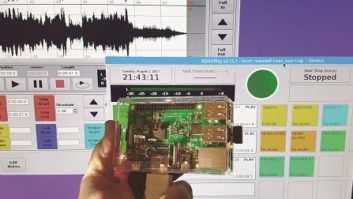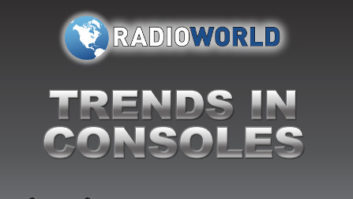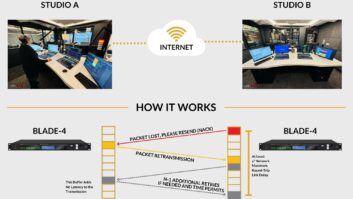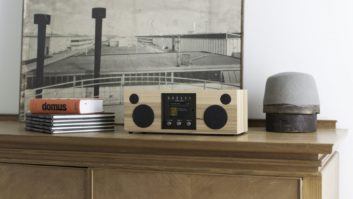LONDON — Some radio stations and voiceover studios are putting to use a new product, which allows broadcast quality audio to be sent using just a Chrome browser and standard Internet connection.
IpDTL has been developed by In:Quality, founded by former BBC studio manager, Kevin Leach. The company won last year’s UK Radio Academy Innovation Award for the service.
Leach previously worked for BBC World Service and BBC Radio 4, where much of his time was spent trying to get guests on air in good quality.


Olympic gold medalist Mo Farah on
BBC Radio 5 live using ipDTL. AN ALTERNATIVE
“This would involve sending a radio car round to their house, or booking a taxi to take the guests to a studio. And sometimes we’d do it from the contributor’s house,” he said. “Skype has become more popular, and on a good day it doesn’t sound too bad, but with a bad mic and a dodgy Internet connection and someone who doesn’t quite know what they’re doing, it could sound pretty awful. Nevertheless radio producers seemed to persevere with it.”
Leach was convinced there was an easier way. “And at that time, Google in particular was putting new code into its browsers to allow for real-time communication. I realized that with some effort it could be used for broadcast — we could raise the bitrate, and take out things that help the average user but deteriorate the broadcast quality, such as echo cancellation, noise reduction and auto gain control.”
During our interview, Leach spoke from his offices in northern England via ipDTL — all that’s required to connect is Google’s Chrome browser on a computer, regular home Internet, and a login to the system. Leach also recommends a good quality external microphone for best results — today, he’s using a Blue Microphones Yeti USB microphone, costing around US$149.
Compared to ISDN, Leach says that with a solid Internet connection, the audio quality is at least comparable: “There are many more variables using the Internet, but it should sound as good or better than ISDN — ipDTL will go to 320 kbps, which means you could do a full radio outside broadcast, playing in the music as well.” The BBC, CBC and WNYC, along with several iHeartMedia (formerly Clear Channel) and Cox Media group stations, are already using the system regularly.
As well as saving on guest expenses, the system includes a chat screen for visual talkback, and a script sharing facility allowing joint real-time document editing. For an extra subscription, ipDTL’s Link Plus gives users a unique URL to share with guests, to connect with them even if they’ve never used the system before.
The guest clicks on the link, and it connects to the user’s account. While there may still be issues with the guest’s own computer, Wi-Fi connection or acoustic location, it means making the connection itself should be simple.

Kevin Leach of In:Quality receives the UK Radio Academy Innovation Award 2013.
OTHER SOLUTIONS
IpDTL can also now stream 1080p HD video. Leach says this does bring more complications, which means this facility hasn’t taken off as quickly as audio, but it has already been used on CNN, Sky News and Al Jazeera.
Meanwhile, existing players are also moving into this market. Source Elements has been supplying Internet audio services and support to studios, voice talent, broadcasters and musicians for the last 10 years.
Its new Source-Connect Now product, again using the Chrome browser, is currently receiving what it describes as “final beta finishing touches” along with the addition of some premium features before full launch. The company says all accounts will be able to connect two people at broadcast-quality 128 kbps for free. For premium features, pricing will start out as low as US$8 a month, with a middle tier around US$24 a month.
A further potential ISDN-replacement is SoundStreak, a downloadable application for Mac OS and Windows, which is then used in either “Production” or “Talent mode.” The service is free for talent, while the production user pays by duration of session.
IpDTL currently offers three levels of subscription, starting at US$15 per month for a basic mono audio package, and rising to US$35 per year for 3 Mbps 1080p HD video.

A Screenshot of the ipDTL User Interface To keep up with demand at ipDTL, Leach has taken on a full-time developer to continue work on the system. Most recently, he added Session Initiation Protocol (SIP) functionality, which most VOIP phone systems run on.
“This means we can connect to devices such as the Comrex Access box used at many radio stations,” said Leach. “In practice, it opens up ipDTL users — regular contributors to radio programs — to a wider range of stations that are perhaps nervous about running Chrome on a computer in their secure environment, but already have a Comrex box in place.”
Leach outlines plans for the future: “SIP also opens up a number of apps for iPhone and Android. They run the open source Opus audio codec, which does mean that ipDTL can connect to mobile devices — we’re still testing before we recommend best practice for that — but it does open up a lot more possibilities.”
Will Jackson reports on the industry for Radio World from London.











